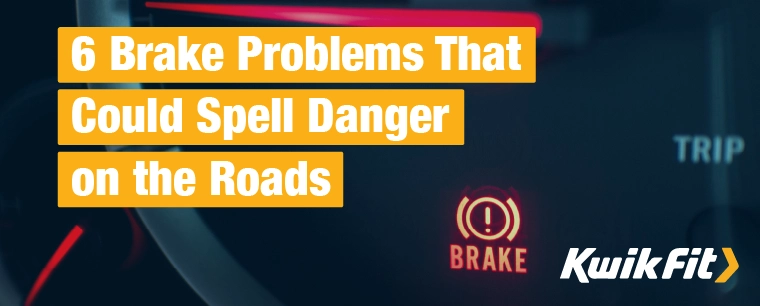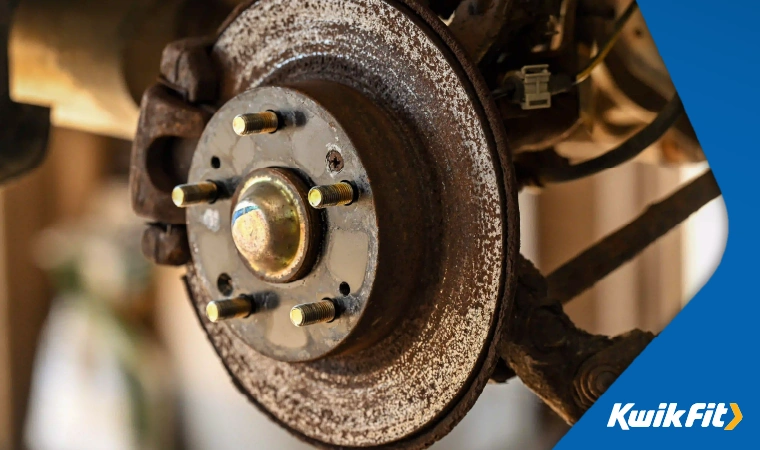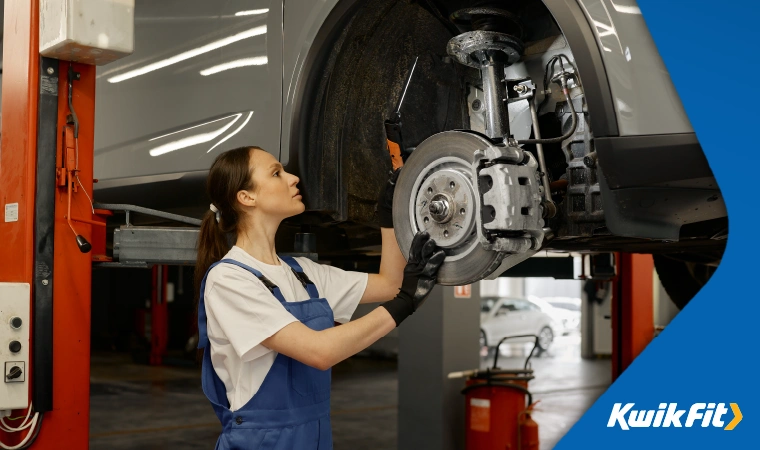6 Brake Problems That Could Spell Danger on the Roads
Jack Dreyer | Friday 13th October 2023 11:45am

As a result of the vital role they play in keeping you safe on the roads, itís really important that you know your stuff when it comes to your carís brakes. This means being aware of the warning signs that somethingís wrong with this crucial safety system ó and knowing what to do when you do spot a problem.
To help ensure youíre up to speed on this subject, here are seven brake issues that can spell danger on the roads.
1. Wear
Brake discs are designed and manufactured to be robust, but they do wear down over time and, if they experience too much wear, they can become unsafe. Each time you press the brake pedal, load is transferred to the front wheels of your vehicle - and the front brakes do the majority of the work to slow you down or bring you to a stop. Because of this, itís normal to have to replace your front discs and pads during the life of your car.
Vehicle makers specify a minimum thickness for discs, and once they reach this point, you have to get them replaced ó along with the pads. This must be done in pairs; you canít replace one set and leave the other as it is.
2. Corrosion
While front brakes are more likely to need replacing due to wear, their counterparts at the rear of your car are most likely to need renewing as a result of corrosion. This is because brake discs are typically made from cast iron. Although this material has many beneficial qualities, one drawback associated with it is the fact that it rusts easily. As rust begins to develop on the surface of discs, it is cleaned off by the action of the pads pressing on them. However, because rear brakes do very little work, the rust on them isnít cleaned away as effectively as it is on the front sets. Itís therefore common for these discs to corrode, particularly on small and light vehicles or ones that are used infrequently and for short journeys.
As corrosion gets worse, it can lead to surface pitting. Although pitting in itself isnít an automatic cause of MOT failure anymore, if discs are deemed to be Ďseriously weakenedí because of pitting, they are seen as dangerous and wonít pass this test. So, if these parts of your braking system corrode too much, youíll need to get them replaced.
Take a look at our guide to cleaning your brake discs if yours need a little TLC!

3. Water in brake fluid
Regardless of the number of miles you clock up behind the wheel, over time the brake fluid in your car will absorb water from the atmosphere.
If your brakes get hot, this moisture can then start to boil and evaporate. Unlike a liquid, this vapour can compress, meaning your brakes may feel Ďspongyí when you press the pedal. You might also lose the ability to stop or slow down effectively. In addition, moisture contained within brake fluid can lead to the corrosion of the brake calipers or wheel cylinders and eventually result in a leak. Either of these scenarios can prove to be extremely dangerous.
Given these potentially serious problems, itís recommended that you get the brake fluid in your vehicle replaced every couple of years.
4. Distortion
If you feel a juddering sensation through the pedal when you slow down, it may be that your brake disc has become distorted. This sometimes happens as a result of uneven heating and cooling, and thin or worn discs are more susceptible to the problem. Distorted discs perform less well, so itís wise to visit a specialist technician if you think your car may have this problem.
There are a few ways you can try to avoid distortion. For one, make sure that you replace thin or severely worn discs in good time! In terms of driving habits, though, itís a good idea to avoid slowing your car down using the brakes for long downhill stretches. This causes the brake discs to become extremely hot. Instead, limit your speed downhill by moving into a lower gear ó a process known as engine braking.
5. Squealing
Squealing brakes can be annoying, and theyíre an indication that somethingís not right. This noise is typically caused by a build-up of brake dust which, thankfully, is not as common as it once was because of design improvements made over recent years.
But if you do get a build up of brake dust, fortunately it can be remedied using a special grease made for brake pads. Keep in mind that this grease must be compatible with the rubber dust seals used in the caliper.
If your brakes start squealing, be sure to visit a technician for advice.
6. Scoring
When brake pads arenít replaced in time, and they wear down too much, their metal backing can start to come into contact with the disc. In turn, this leads to scoring and can seriously reduce your ability to slow down and stop. As well as increasing your risk of accidents, this can ultimately result in a more costly repair. If you ignore the early symptoms of scoring, itís likely youíll need to replace your discs too, as a result of the damage done to them.
The first sign of this problem is an unpleasant metallic noise when you press the brake pedal. If you notice this, make sure you take your car to a specialist as soon as possible.

Regular servicing, healthy brakes
Having your car serviced regularly should help you to avoid any issues with your brakes, keeping you safe and giving you extra peace of mind. Meanwhile, if you do spot any warning signs, or you have any questions about your vehicleís braking system, donít hesitate to contact our experts. You can book a free visual check or full inspection online that will determine whether any action needs to be taken.
Any facts, figures and prices shown in our blog articles are correct at time of publication.
Featured Articles
Is it Illegal to Drive With One Headlight?
Saturday 19th July 2025
Wondering if itís illegal to drive with one headlight? Learn about the safety risks and penalties of illegal blown bulbs and why you should fix them promptly.
Air Con in EVs & Hybrids: Experts Answer Your Questions
Monday 30th June 2025
Does air con drain EV batteries? Can you use the air con while charging an electric car? Find out the answers to these questions & more from Kwik Fitís experts.
Why Is Your Car Making a Noise? Fixes & Tips
Friday 13th June 2025
When your car starts making unexpected noises, it can certainly be quite disconcerting; it may be nothing to worry about, but hereís what you need to know.









